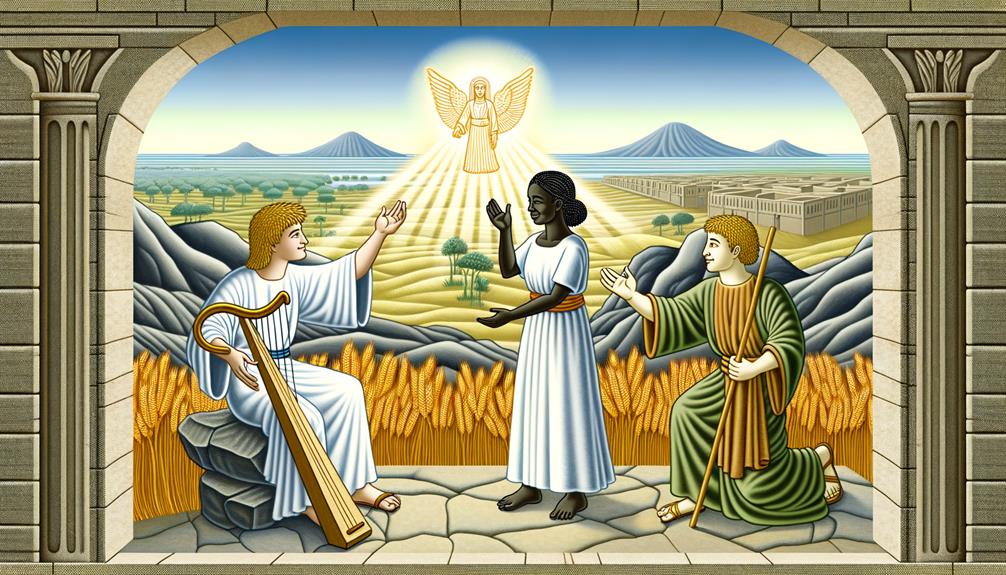Good Names in the Bible and Their Meaning: Explain
When I explore biblical names, their meanings and historical context enrich my understanding of scripture. Adam, from ‘adamah’ in Hebrew, means ‘ground,’ connecting humanity to the earth.
Noah’s name, from ‘Noach,’ signifies ‘rest.’ Abraham, once Abram, means ‘father of many nations,’ symbolizing his key role in spiritual lineage. Sarah, originally Sarai, means ‘princess,’ while Moses means ‘drawn out,’ exemplifying leadership.
David means ‘beloved,’ and Solomon, known for wisdom, fulfilled great works. Elijah (‘Yahweh is my God’), Isaiah (‘Yahweh is salvation’), and Mary (‘beloved’) each highlight faith.
Finally, Jesus, from ‘Yeshua,’ means ‘God saves.’ Curious about more?

Top 10 Good Names in the Bible and Their Meanings
| Name | Meaning | Biblical Reference |
|---|---|---|
| Abraham | Father of many nations | Genesis 17:5 |
| David | Beloved | 1 Samuel 16:13 |
| Elijah | My God is Yahweh | 1 Kings 17:1 |
| Isaac | Laughter | Genesis 17:19 |
| Joshua | The Lord is salvation | Joshua 1:1 |
| Samuel | God has heard | 1 Samuel 1:20 |
| Solomon | Peace | 1 Kings 1:39 |
| Daniel | God is my judge | Daniel 1:6 |
| Joseph | God will add | Genesis 30:24 |
| John | The Lord is gracious | Luke 1:13 |
Adam

Adam’s name, derived from the Hebrew word ‘adamah’ meaning ‘ground’ or ‘earth,’ reflects his creation from the soil according to the Genesis narrative.
I find this etymology deeply symbolic, as it emphasizes our connection to the earth and our role as stewards of creation. In Hebrew, ‘adam’ also means ‘man,’ underlining Adam as the first human.
This dual meaning suggests a profound link between humanity and our environment. By understanding Adam’s origins, we can appreciate the responsibility we’ve been given to care for the world and each other.
The narrative of Adam reminds us that our existence is rooted in nurturing and preserving the ground from which we came, serving both people and the planet.
Noah

When I look into the name Noah, I find it originates from the Hebrew word ‘Noach,’ meaning rest or comfort, which perfectly aligns with his role in Genesis as a bringer of relief from the earth’s corruption.
Noah’s faith and obedience led to the construction of the Ark, a symbol of salvation and divine protection.
Through these points, we can see how Noah’s name and story embody themes of redemption and hope.
Meaning of Noah’s Name
The name Noah, derived from the Hebrew ‘Noach,’ means ‘rest‘ or ‘comfort,’ reflecting the promise of relief from the toil and sorrow of a cursed ground as described in Genesis 5:29.
When I explore the original Hebrew text, I find that ‘Noach’ comes from the root word ‘nuach,’ which means to rest, settle down, or give comfort.
In the historical context, Noah’s name is a beacon of hope and solace during a time of great hardship.
Understanding this meaning can inspire us to be sources of comfort to others, especially when they face their own struggles.
It reminds me that names in the Bible often carry profound significance, pointing to deeper spiritual truths and lessons.
Noah’s Role in Genesis
Noah’s pivotal role in Genesis encompasses being chosen by God to build the ark, thereby ensuring the survival of humanity and animal life through the cataclysmic flood.
His story, found in Genesis 6-9, is a reflection of faith, obedience, and divine favor. The Hebrew name ‘Noach’ means ‘rest’ or ‘comfort,’ reflecting his role in bringing solace to a corrupted world.
Here’s what Noah did:
- Built the Ark – Following God’s specific instructions.
- Gathered Animals – Two of every kind, ensuring biodiversity.
- Survived the Flood – Endured 40 days and nights of rain.
- Repopulated the Earth – Restarted human civilization post-flood.
Symbolism of the Ark
God’s directive to construct the ark symbolizes divine protection and a covenant of salvation amidst judgment.
In Hebrew, ‘ark’ is ‘teivah,’ conveying a sense of preservation. The ark wasn’t just a boat; it was a sanctuary, reflecting God’s mercy in a time of widespread corruption.
Historically, Noah’s obedience amidst a wicked world highlights the importance of faith and righteousness. The dimensions and specifications given in Genesis 6:14-16 are precise, underscoring God’s meticulous plan for salvation.
As I reflect on this, I see the ark as a call to serve and protect others, just as Noah did for his family and the animals. It reminds me that in following God’s instructions, we create sanctuaries of hope and safety for those around us.
Abraham

I find Abraham’s story particularly compelling due to the covenant he made with God, which is pivotal in biblical history.
Originally named Abram, his transformation to Abraham, meaning ‘father of many‘ in Hebrew, underscores his role as the progenitor of nations.
This name change wasn’t just a personal shift but a powerful symbol of his new, divinely ordained mission.
Covenant With God
In examining the covenant with God that Abraham entered into, we see a foundational moment in biblical history where faith and divine promise intersected, shaping the course of the Israelite nation. This covenant, described in Genesis 15 and 17, involved several key elements that highlight the depth of Abraham’s relationship with God:
- Promise of Land: God promised Abraham’s descendants the land of Canaan (Genesis 15:18-21).
- Numerous Offspring: Despite his old age, Abraham was promised countless descendants (Genesis 15:5).
- Sign of Circumcision: As a sign of the covenant, every male descendant was to be circumcised (Genesis 17:10-11).
- Name Change: Abram was renamed Abraham, signifying his new role in God’s plan (Genesis 17:5).
This covenant underscores the importance of faith, obedience, and service.
Father of Nations
Through a divine declaration, Abraham was appointed as the ‘Father of Nations,’ a title that not only reflected his role in God’s covenant but also signified his pivotal place in the historical and spiritual lineage of the Israelite people.
This term, rooted in the Hebrew ‘Avraham’ (אברהם), encapsulates his destiny to father a multitude of descendants. In Genesis 17:5, God promises Abraham, ‘I have made you a father of many nations.’ This covenantal promise marked a significant shift, emphasizing his influence across generations.
Abraham’s unwavering faith and obedience serve as an enduring example for those who seek to live lives of service and commitment to a greater purpose. His story inspires us to trust and serve wholeheartedly.
Name Transformation Symbolism
God’s renaming of Abram to Abraham symbolizes a profound transformation, reflecting his new identity and divine purpose in the covenantal narrative. The name change from ‘Abram’ (exalted father) to ‘Abraham’ (father of many) in Genesis 17:5 marks a pivotal moment in biblical history. This shift underscores God’s promise to make Abraham the progenitor of a multitude of nations.
Understanding this transformation involves:
- Historical Context: It occurs within the broader Abrahamic covenant, a foundational element of Judeo-Christian theology.
- Original Languages: The Hebrew roots of ‘Abram’ (אַבְרָם) and ‘Abraham’ (אַבְרָהָם) highlight the significance.
- Divine Mission: Abraham’s new role aligns with his divine calling to lead and serve.
- Symbolic Meaning: It emphasizes faith, obedience, and God’s providential plans.
Sarah

Although she initially laughed at the promise, Sarah’s transformation from skepticism to faith is a pivotal story in the Bible, deeply rooted in the ancient Hebrew narrative. Her journey highlights the significance of trust in divine promises. Originally named Sarai, meaning “my princess” in Hebrew, her name was changed by God to Sarah, signifying “princess” or “noblewoman.” This change reflected her role as the mother of nations. Her story is a reminder that faith can flourish even in the most doubtful hearts.
| Name | Meaning |
|---|---|
| Sarai | My Princess |
| Sarah | Princess/Noblewoman |
| Abraham | Father of Many |
| Isaac | He Will Laugh |
| Hagar | Flight |
Sarah’s legacy inspires us to serve others with faith and perseverance.
Moses

Moses, whose name means ‘drawn out’ in Hebrew, stands as one of the most pivotal figures in the Bible, leading the Israelites out of Egyptian bondage and receiving the Ten Commandments on Mount Sinai. His life, filled with divine purpose, offers several lessons for those who desire to serve others:
- Leadership: Moses’ unwavering commitment to God and his people exemplifies true leadership.
- Faith: His trust in God, even when faced with immense challenges, showcases profound faith.
- Humility: Despite his significant role, Moses remained humble, always seeking God’s guidance.
- Intercession: Moses tirelessly prayed for his people, showing the power of intercessory prayer.
Through understanding Moses’ name and deeds, we can draw inspiration for our own lives of service.
David

Just as Moses’ leadership was integral to the Israelites’ journey, David’s reign as king showcases a life marked by courage, artistry, and a deep, personal relationship with God.
The name David comes from the Hebrew ‘Dawid,’ meaning ‘beloved.’ He was a shepherd, musician, and poet before becoming king. His Psalms reveal a heart devoted to worship and service.
Historically, David unified the tribes of Israel and established Jerusalem as the nation’s capital. His life wasn’t without flaws, yet his repentance and faithfulness illustrate that anyone can seek God’s heart.
Through David’s story, we learn the importance of humility, bravery, and a commitment to God’s will, serving as an inspiration for us all to lead with love and integrity.
Solomon

When I think of Solomon, I first consider his unparalleled wisdom and immense wealth, both gifts attributed to divine favor.
Historically, Solomon’s reign marked a period of prosperity and stability, with the construction of the First Temple in Jerusalem standing as a monument to his dedication to God and his people’s faith.
The Hebrew texts refer to him as ‘Shlomo,’ emphasizing peace and completeness, which are central themes in his story.
Wisdom and Wealth
Solomon, renowned for his unparalleled wisdom and immense wealth, is a central figure in the Bible whose reign is often studied for its profound impact on Israel’s history and culture. His wisdom, granted by God, and vast riches offer valuable lessons for those seeking to serve others. Solomon’s Hebrew name, שׁוּלְמִיֵּה (Shlomo), means ‘peaceful.’
Consider these key aspects of Solomon’s wisdom and wealth:
- Divine Wisdom: Solomon asked God for wisdom to govern his people justly, receiving not only wisdom but also wealth (1 Kings 3:9-13).
- Judgment: His famous judgment between two women claiming the same baby showcases his deep understanding (1 Kings 3:16-28).
- Proverbs: Solomon authored many proverbs, offering practical guidance (Proverbs 1:1).
- Economic Prosperity: His reign brought unprecedented wealth and prosperity to Israel (1 Kings 10:14-29).
Temple Construction
Building on his wisdom and wealth, Solomon’s crowning achievement was the construction of the Temple in Jerusalem, a monumental task that underscored his devotion to God and his vision for Israel.
The Hebrew term for temple, ‘בית המקדש’ (Beit HaMikdash), means ‘House of the Holy.’ Solomon’s efforts fulfilled his father David’s dream to create a permanent dwelling for the Ark of the Covenant.
Employing skilled labor from Tyre, Solomon used cedar, gold, and fine stone, symbolizing Israel’s prosperity and piety. The Temple’s intricate design reflected divine specifications detailed in 1 Kings 6.
For those serving others, Solomon’s Temple is a powerful reminder that our greatest works should honor God and uplift our communities.
Elijah

Elijah, whose name means ‘Yahweh is my God’ in Hebrew, stands out as one of the most compelling prophets in the Bible due to his unwavering faith and dramatic confrontations with the prophets of Baal. His story is a reflection of the power of faith and the importance of standing firm in one’s beliefs.
Key moments in Elijah’s life include:
- Confrontation on Mount Carmel: Elijah challenges 450 prophets of Baal to prove the power of God (1 Kings 18).
- Raising the Widow’s Son: Demonstrating God’s power over life and death (1 Kings 17).
- Encounter with God: Hearing God’s voice in a gentle whisper (1 Kings 19).
- Chariot of Fire: Being taken up to heaven in a whirlwind (2 Kings 2).
Elijah’s life inspires us to serve others with unwavering faith.
Isaiah

Isaiah, whose name means ‘Yahweh is salvation’ in Hebrew, emerged as a pivotal prophet during a turbulent period in Israel’s history, offering profound insights and prophecies that have echoed through the ages.
Living in the 8th century BCE, Isaiah’s words addressed the moral and spiritual decline of Israel and Judah. His prophecies, written in Hebrew, reflect deep theological insight, emphasizing God’s holiness and the need for repentance.
Isaiah’s call for social justice and compassion resonates with those who seek to serve others. His vision of a future Messiah brought hope and remains a cornerstone of Judeo-Christian belief.
Mary

Among the revered figures in biblical history, Mary stands out not only for her faith but also for her role as the mother of Jesus, which has deeply influenced Christian theology and devotion throughout the centuries. Her name, derived from the Hebrew ‘Miryam,’ carries meanings like ‘beloved’ and ‘rebellion.’
Mary’s life is a reflection of humility and obedience to God’s will. To understand her impact:
- Annunciation: Gabriel announces her role in Jesus’ birth (Luke 1:26-38).
- Visitation: Mary visits Elizabeth, showing service and compassion (Luke 1:39-45).
- Nativity: She gives birth to Jesus, fulfilling prophecies (Luke 2:1-7).
- Wedding at Cana: Mary prompts Jesus’ first miracle, highlighting her faith (John 2:1-11).
Mary’s example continues to inspire those who seek to serve others with humility and devotion.
Jesus

Jesus, whose name in Hebrew is ‘Yeshua’ meaning ‘God saves,’ stands as the central figure in Christianity and has profoundly shaped the religious, cultural, and historical landscape of the world. His life, teachings, and sacrifice are foundational to the Christian faith. Understanding the significance of his name provides deeper insights into his mission and identity.
| Language | Name |
|---|---|
| Hebrew | Yeshua |
| Greek | Iēsous |
| English | Jesus |
The name ‘Yeshua’ links directly to the Hebrew verb ‘yasha,’ meaning to rescue or deliver, reflecting his role in salvation. Jesus’ impact extends beyond theology, influencing art, literature, and ethics, guiding millions in their quest to serve others with compassion and humility.
Conclusion
So, what do these names teach us?
From Adam’s creation to Jesus’ salvation, each name in the Bible carries profound meaning and historical context. In the Old Testament, names like Ruth, Esther, and Sarah have significant biblical female names meaning. These women played important roles in the history of the Israelites and their names are a reminder of their strength, faith, and resilience. Each name in the Bible serves as a window into the cultural and historical contexts of the people who carried them, making them more than just labels but rather symbols of identity and purpose.
Understanding their original languages enriches our appreciation of these figures.
Don’t these names, etched in ancient texts, connect us to timeless stories of faith, struggle, and redemption?
Our journey through these names isn’t just about history—it’s about understanding our own place in the grand tapestry of human experience.






